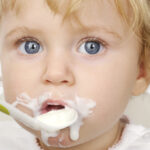Homeopathic Teething Tablets Could Cause Severe Side Effects
Homeopathic Teething Tablets Could Cause Severe Side Effects
The Federal Trade Commission and The Federal Drug Administration (FDA) are investigating more than 400 reports of severe adverse events in infants after the administration of homeopathic teething tablets containing Belladonna or deadly nightshade, a potent alkaloid associated with seizures, tremor, lethargy, shortness of breath, constipation, vomiting, irritability and even death. The information appears in the Medical News and Perspectives of the latest issue of the Journal of The American Medical Association, February 28, 2017.
How can a homeopathic product cause such a list or severe side effects? Aren’t these preparations supposed to be safe?
 The preparation of homeopathic medications follows the principle “like cures like”, the article explains. This is the idea that a substance that triggers a disease in a healthy person could be the cure for a sick one, a principle that contradicts all scientific knowledge to date. They are also prepared under the rule of “minimum dose”, where a substance is diluted in water and a fraction of the mixture is diluted again and again, after agitation, with the hope that the end product would conserve the properties of the original substance. This principle alone should make these medications safe, since at the end of the dilutions the product is more similar to water than to any other active substance. In the case of the teething tablets, the end product contained an elevated level of belladonna, causing toxic effects.
The preparation of homeopathic medications follows the principle “like cures like”, the article explains. This is the idea that a substance that triggers a disease in a healthy person could be the cure for a sick one, a principle that contradicts all scientific knowledge to date. They are also prepared under the rule of “minimum dose”, where a substance is diluted in water and a fraction of the mixture is diluted again and again, after agitation, with the hope that the end product would conserve the properties of the original substance. This principle alone should make these medications safe, since at the end of the dilutions the product is more similar to water than to any other active substance. In the case of the teething tablets, the end product contained an elevated level of belladonna, causing toxic effects.
Since 2009, the FDA issued about 40 different warning letters about homeopathic medications with potential toxic effects, including Zinc cold preparations and asthma products.
The difference between regular FDA approved or regulated pharmaceuticals and homeopathic product is that homeopathic medications don’t require pre-marked testing for safety and efficacy, although they must indicate to consumers the lack of evidence of medical cures. Pre-marketing trials are expensive and time consuming and most of these products would have real difficulty comparing their effects to placebo, since the progressive dilutions would render them similar to water.
We are informed that the manufacturers of most of these teething tablets have voluntarily recalled their products, but they may still exist in some pharmacies or in your medicine cabinet.
We often blame the innocent teething process for any and all alignments causing crying in an infant, when in reality “teething” only causes “teeth”. I read this sharp statement somewhere and I can’t resist sharing it with you today.
If your newborn or infant has inconsolable crying, to the point where you think he or she may need medication, bring the baby to the office and share your concerns with us. In my 30 years as a doctor I diagnosed “teething” a handful of times, and in none of those cases did I recommend medication. I confess I was also under the assumption homeopathic products geared to infants were safe and containing no toxic active principle. I now know better.

 Previous Post
Previous Post



